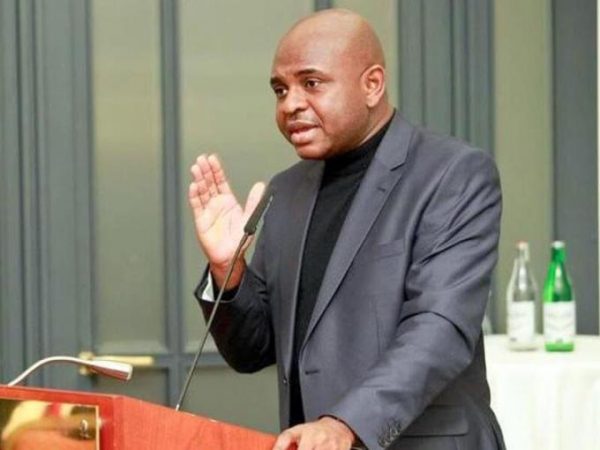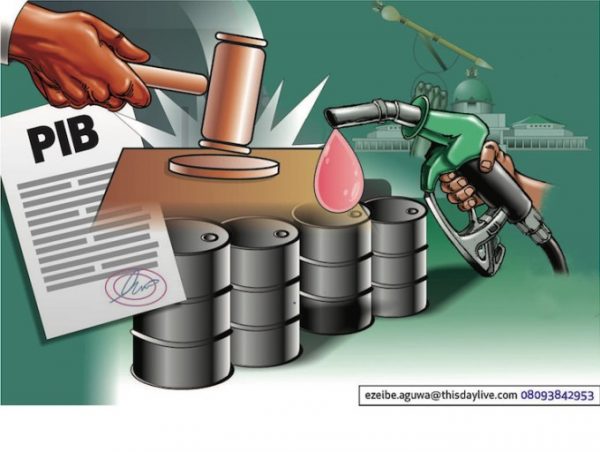Moghalu Calls for ‘Partial Privatisation’ of NNPC

A former Deputy Governor of the Central Bank of Nigeria (CBN), Prof. Kingsley Moghalu yesterday called for a ‘partial privatisation’ of the Nigerian National Petroleum Corporation (NNPC) with its shares listed on the Nigerian Stock Exchange (NSE).
This, according to him would help improve governance in the corporation.
This formed part of the recommendations by Moghalu in a presentation titled: “The Challenge of Economic Growth in Nigeria,” which he delivered at the fifth Goddy Jidenma Foundation public lectures in Lagos.
However, he pointed out that in partially privatising the NNPC, the government must ensure that the interests of the local communities in oil-producing regions are protected.
He also advised that from 2019, the federal government should establish a concrete economic diversification plan with a concrete path to a post-oil future for Nigeria, based on emerging global trends.
“This plan, akin to the Saudi Arabian government’s economic diversification plan, should include a clear strategy with interlinked policies – trade, industrial, fiscal – and far-reaching structural and governance reforms of the Nigerian National Petroleum Corporation that could include partial privatisation,” he said.
Furthermore, Moghalu, who is the Founder & President, Institute for Governance and Economic Transformation said: “To create millions of jobs within a four to five-year period, Nigeria should establish a public-private partnership private equity and venture capital fund to support job-creation through access to entrepreneurship capital.
“This fund should be established with not less than N500 billion, with contributions from the federal government and private sector funders, and be run on a for-profit basis as a private company by private sector managers.
“Mutual accountabilities must be established between the government and private sector partners, and for the operating entity.”
In addition, he recommended that governments at all levels should reduce unemployment in a strategic and systemic manner, stressing the need for a fundamental overhaul of Nigeria’s educational system in order to cut the system’s propensity to produce graduates who would join the long lines of the unemployed.
“A two-track educational system should be established at secondary school level, one track going into vocational skills training, the other going into tertiary institutions reconfigured to produce graduates in applied technology and entrepreneurship subjects in a ratio of 70:30 to non-technology or entrepreneurship subjects,” he said.
Commenting on ways to shore-up Nigeria’s non-oil revenue in the 38-page paper, Moghalu also advised Nigeria’s tax authorities to follow the ownership trail of the country’s estimated 140 million mobile telephone lines to bring operators in the informal economy in the tax net and the formal economy. “This approach will generate dramatically increased internal revenue and reduce the need for external indebtedness. In return, the government must enter into, and deliver on, a solemn social contract with the Nigerian people to provide our citizens with the most basic goods of security, access to education and quality healthcare, and infrastructure,” he said.
He cautioned the federal government against further foreign borrowing, saying considering the government’s declining revenue profile, further indebtedness was not sustainable and would likely lead to a debt crisis.
“The federal government needs to establish a “hedging” arrangement to manage the risks of oil price volatility. The federal government should institute “smart protectionism” using tariffs to protect infant industries in Nigeria for a seven-year period, under the auspices of the Special and Differentiated (S&D) provisions of the World Trade Organisation treaty.
“The government should subsidise manufacturing, but with incentives and accountabilities from manufacturing companies in terms of their exports to the ECOWAS, African and broader global markets. No export orders, no subsidies.
“The Constitution of Nigeria should be amended to make the Development Bank of Nigeria a first-line charge to the Consolidated Revenue Fund of the Federation. This will enable the Bank to provide funding for big-ticket infrastructure items at single-digit interest rates.
“Economic planning in Nigeria should henceforth take a regional approach based on economies of scale from the six geopolitical zones, based on the competitive and comparative advantages of the zones.
“Power policy in Nigeria should henceforth prioritise industrial clusters such as Aba, Kano, Lagos, Nnewi, and Onitsha. Nigeria needs to make massive investments in renewable energy that can serve households.
“The Land Use Act should be abolished. Doing so will help improve access to capital in the economic system because freehold land ownership will provide additional levels of collateral for bank or other forms of borrowing to start businesses. The law has outlived its usefulness and creates bureaucratic bottlenecks in the economy, especially in investment,” he added.
Continuing, he said: “Nigeria has failed to achieve sustained economic growth largely because of a failure of political leadership. The absence of competent leadership, which must for a developing country include a solid understanding of economic and public policy, prevents real economic progress.
“From crude oil-revenue dependency to excessive recurrent expenditure, from political interference in the central bank to returning Nigeria closer to debt peonage, Nigeria’s political leaders have stymied Nigeria’s economic development through a combination of incompetence and the servicing of their vested interests.
“The fundamental solutions to our crisis of economic growth and development lie in leadership. Not the politics-as-usual of the past, but a new kind of politics of ideas. It will take this kind of politics to produce the vision and political will to undertake the necessary economic and institutional reforms.”







